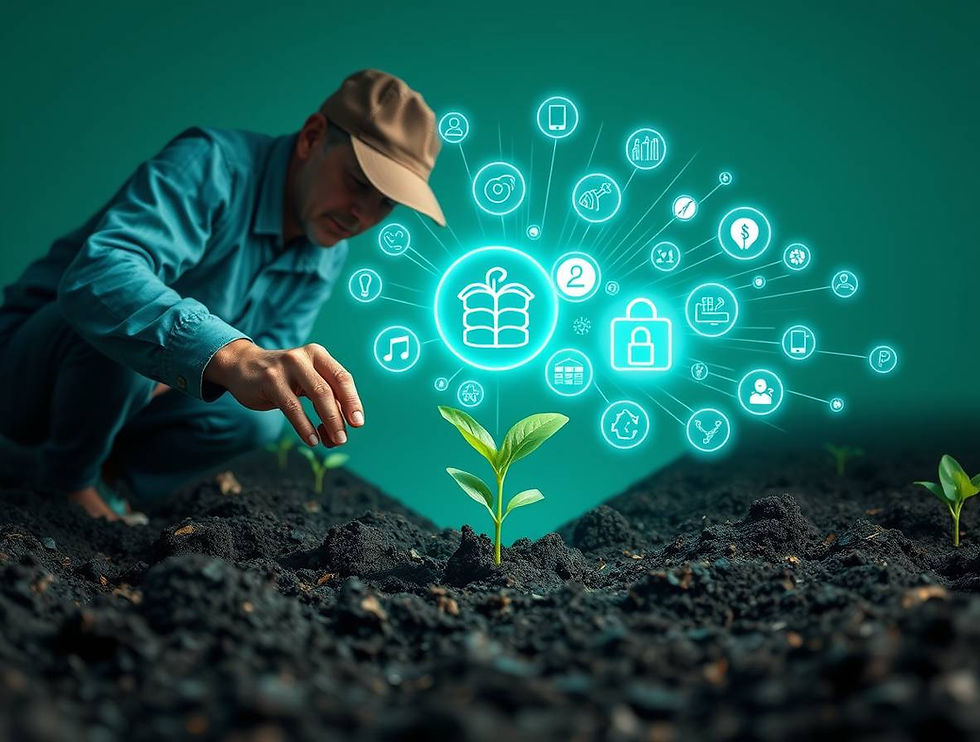Empowering Farmers for a Sustainable Tomorrow: Education and Technology for All
- CYOL Press Release

- Aug 27, 2025
- 4 min read
By CYOL Staff
Farmers are the true backbone of our global food systems. Every meal we eat, every market we visit, and every community that thrives owes a debt to the dedication and hard work of farmers. Yet, despite their critical role, farmers around the world face growing challenges. Climate change, limited resources, unpredictable markets, and rising production costs threaten not only their livelihoods but also global food security.
To overcome these challenges and build a sustainable future, we must focus on empowering farmers. True empowerment means more than providing resources; it is about giving farmers the knowledge, skills, and tools to adapt, innovate, and thrive in a changing world. Education and technology stand at the heart of this empowerment, helping farmers increase productivity, protect natural resources, and secure better futures for themselves and their communities.

Why Farmer Empowerment Matters
Empowering farmers is essential because they are at the frontline of both food production and environmental stewardship. With the right education and access to modern technology, farmers can transform challenges into opportunities. Education equips them with the knowledge to make informed decisions, while technology provides practical tools to put that knowledge into action. Together, these two pillars enable farmers to:
Farmers can improve their productivity by learning best practices and using modern tools to grow more with fewer inputs. Education and technology also help them adapt to climate change by teaching resilient practices and providing access to predictive tools that reduce risks from floods, droughts, and unpredictable weather. With better training, farmers can achieve resource efficiency, ensuring that water, soil, and energy are used wisely. Finally, digital platforms give farmers direct access to markets, reducing reliance on intermediaries and increasing their profits.
Education: The Cornerstone of Empowerment
Education is the foundation on which farmer empowerment is built. When farmers are equipped with knowledge, they can innovate within their unique contexts and embrace sustainable practices that improve both productivity and resilience.
Practical training programs, such as workshops and field schools, give farmers hands on learning experiences in areas like soil health, crop rotation, pest management, and organic farming. Beyond physical training, accessible resources in the form of simple guides, videos, and mobile applications ensure that farmers continue to learn in their own time and their languages. Inclusivity is key here; education must reach even the most remote communities.
Community based knowledge sharing also plays a vital role. Farmer cooperatives and peer to peer learning networks foster collaboration, where farmers exchange experiences, evaluate innovative methods, and learn from each other’s successes and challenges. These collective efforts create strong networks of support, ensuring that no farmer is left behind.

Technology: Bridging the Gap
While education provides the “why” and “how,” technology delivers the “what” and “with what.” By democratizing access to advanced tools, technology ensures that farmers can translate knowledge into action, improving both yields and sustainability.
Smart farming tools such as IoT devices, soil sensors, and drones are transforming agriculture. These technologies deliver real time data about soil conditions, weather patterns, and crop health, allowing farmers to make precise and data driven decisions. For example, precision irrigation systems help farmers save water while maintaining healthy crops.
Mobile applications are another powerful resource. Many apps are now designed specifically for farmers, offering insights on planting schedules, local weather forecasts, and current market prices. Importantly, many of these apps can work offline, making them accessible even in remote regions with limited internet connectivity.
E commerce platforms are also reshaping how farmers do business. By connecting directly with buyers, farmers gain fairer prices for their products while reducing dependence on intermediaries. At the same time, digital tools for microfinance are opening doors for smallholder farmers to access credit, insurance, and financial services. This safety net gives them the confidence to take risks, invest in better methods, and grow their businesses sustainably.
The Role of Stakeholders
Farmer empowerment is not something that can be achieved in isolation. It requires the combined efforts of multiple stakeholders working together.
Governments must play their part by creating policies that make education and technology affordable and accessible to all farmers. Private sector companies, from startups to global enterprises, can innovate scalable, cost effective solutions while partnering with public institutions to reach rural communities. NGOs are equally important, acting as bridges that connect resources, knowledge, and training with those who need them most. Finally, academic institutions contribute by conducting region specific research, ensuring that both education and technology are relevant to local contexts.
This collaborative approach creates an ecosystem where farmers are supported on every level, from policy to practice.

A Path to a Sustainable Tomorrow
Empowering farmers is not only about improving agriculture; it is about investing in humanity’s shared future. When farmers are equipped with education and technology, they can produce more with fewer resources, reducing agriculture’s environmental footprint. They can also build resilient communities that are better prepared to withstand economic fluctuations and climate shocks.
Most importantly, empowered farmers become agents of change. They are not just food producers; they are environmental stewards, innovators, and contributors to global food security. By giving them the tools to succeed, we create a ripple effect that benefits entire societies, economies, and ecosystems.
A sustainable tomorrow is possible if we act today. Imagine a world where every farmer, regardless of their size or location, has equal access to knowledge and technology. A world where communities thrive because their farmers thrive. This is not a distant dream; it is an achievable reality. By investing in farmer empowerment, we can cultivate a sustainable tomorrow, one field and one farmer at a time.
























Comments